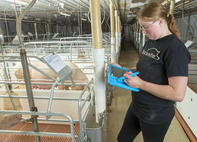In agriculture, farmers need to constantly adapt to changing conditions. These changing conditions can include fluctuating prices of fuel, seed, packaging and feed, new decisions made and implemented by the government, changing market conditions and new production methods. Good farm management enables the farmer to respond better to these changes in order to manage costs, minimise risks and maximise profits.

The Farmer as Manager
The farmer has two main roles, as manager of the farm but also as a cultivator. The cultivation skills of the farmer are more physical, but the management of the farm is about planning, decision-making and the implementation of plans and decisions.
To manage a farm, the farmer must set goals, plan how to achieve these goals, implement the plans, organise the resources - staff, money, time, land - and keep control over the whole process.
The most important aspect of farm management is decision-making. Decisions can range from which crop to plant, when to irrigate, where to buy livestock, when to sell, which market to supply, which technology is the best to use and how to allocate available labour between farming operations.
Activities of Farm Management
Farm management can include the following activities: Identify potential problems and opportunities. Choosing possible solutions. Implementing a plan. Control the progress of the plans and solution. Coordination of activities to meet the planning objectives. Evaluate the results of the plan.Information Systems for Farm Management
In order for farmers to manage their farms, they need information systems. Where do farmers get information about their farms? Farm information can come from two sources, from outside the farm (external) and from the farm itself (internal).
External sources of farming information include farming websites, farming apps, magazine articles, farmers’ days, study groups, consultants and cooperatives. Internal sources include the farm’s own records and financial statements - two more reasons why recordkeeping in farming is so important.
Farm records usually consist of documents such as a physical inventory, a record of money owed and money that needs to be paid, records of receipts and expenditures, labour records, machinery records and physical production records.
Why is Farming Information Important?
Farming information is essential to measure the performance and progress of a farm over time. This information creates a basis to compare current farm performance with previous years.
Having farm records and information available can help farmers set goals and evaluate the farm’s financial position according to these goals. It can help the farmer to determine where the strong and weak points of his farm are.
Having clear and up-to-date financial records can help with the financial management of a farm, up-to-date financial records of a farm can help a farmer to improve tax planning, establish a basis to apply for credit or financing and to monitor the cash flow position of the farm. It is crucial to have strict control over the finances of the farm in order to know what has been spent and done at any given time during the year.
Source Water Research Commission